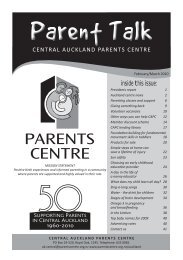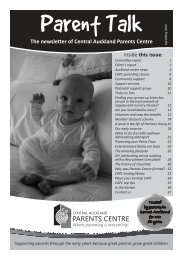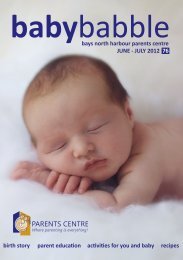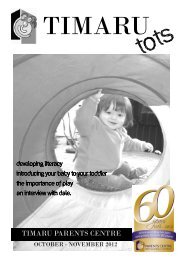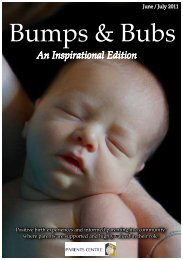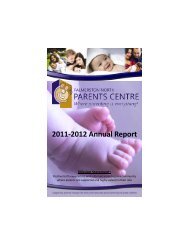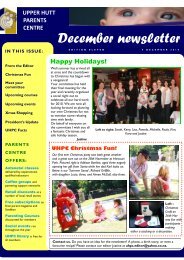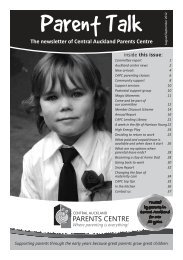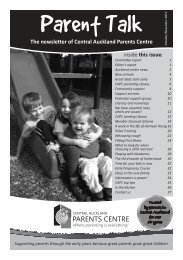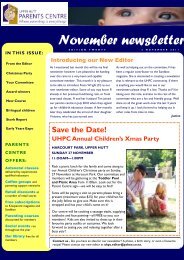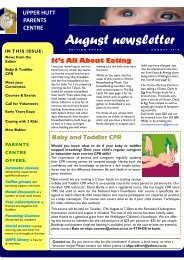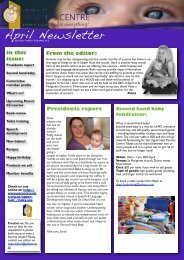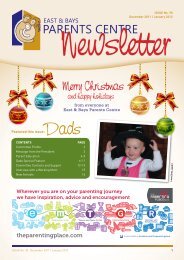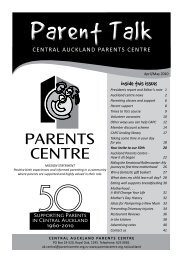Motherhood Flyer - Parents Centres New Zealand Inc
Motherhood Flyer - Parents Centres New Zealand Inc
Motherhood Flyer - Parents Centres New Zealand Inc
Create successful ePaper yourself
Turn your PDF publications into a flip-book with our unique Google optimized e-Paper software.
MEANINGMOTHERHOOD 28 November 2008<br />
Afternoon Workshops<br />
Exploring <strong>Motherhood</strong>*<br />
* Each conference parEcipant will choose two workshops<br />
Workshop 1:<br />
Am I S;ll a Mother? Making Meaning of <strong>Motherhood</strong><br />
AIer the Death of a Baby<br />
Vicki Culling & Claire Wright<br />
Pregnancy, as a rite of passage, has a liminal status that<br />
places women between two structural states ‐ that of<br />
before and a9er the arrival of the child. We will discuss<br />
the absence of one group of mothers who remain<br />
suspended between those two states ‐ neither<br />
expec4ng their child nor having them biologically<br />
present. What becomes of these mothers? Do they<br />
have the right to be called mothers if the way we<br />
construct motherhood is based on the presence of<br />
children? What language is available to those mothers<br />
in terms of voicing their experience and claiming<br />
themselves as mothers? Almost all of the literature<br />
that focuses on motherhood goes on to discuss the role<br />
of children in the maintenance of iden4ty, on dominant<br />
motherhood ideologies ('good mother' versus 'bad<br />
mother') and myths of motherhood. Some4mes there<br />
are references to those that fall outside the dominant<br />
model ‐ the teenage mothers, single mothers, lesbian<br />
mothers. Nowhere is there any discussion about the<br />
babyless/childless mother. We want to start such a<br />
discussion. We will draw upon the experiences of<br />
different mothers whose children have died ‐ mothers<br />
who have no living children, mothers whose first born/<br />
children died and now have subsequent living children,<br />
mothers who had living children and whose<br />
subsequent baby/child died.<br />
Workshop 2:<br />
Who Are Teen Mothers? We Know Who We Are!<br />
Ruth MarEs<br />
Teenage pregnancies have become an issue of<br />
increasing concern in Aotearoa/<strong>New</strong> <strong>Zealand</strong>. Currently<br />
If an expectant mother walked into a library and asked,<br />
‘How will my baby develop?’ the librarian could show<br />
her some books on infant development. If, however,<br />
she asked, ‘What about me? How will I develop as a<br />
mother?’ the librarian would probably look surprised.<br />
The idea that mothers develop isn’t a common subject<br />
for a book. Almost the opposite. Many people seem<br />
to think that mothers risk stagnating. Especially if a<br />
mother isn’t out at work, people assume she must be<br />
‘stuck’ at home doing boring and repetitive chores with<br />
little to stimulate her.’<br />
Naomi Stadlen<br />
we have the second highest teenage pregnancy rate in<br />
the developed world. Young teenage women who are<br />
pregnant o9en do not seek early antenatal care for a<br />
variety of reasons and are unlikely to breasteed their<br />
babies. They feel isolated and judged in our society. In<br />
the 2002 Maternity Services Consumer Survey, women<br />
aged 15‐19 were less likely than older mothers to have<br />
been sa4sfied with maternity services. Yet, the truth is,<br />
if we would listen to their voices we would discover<br />
what motherhood means to these young women, how<br />
motherhood is constructed via their experiences and<br />
what iden4fied support could assist them in their<br />
journey to motherhood. The presenta4on will cover<br />
some <strong>New</strong> <strong>Zealand</strong> sta4s4cs of teenage pregnancies<br />
and explore needs and issues that might surround and<br />
affect teenage mothering through a visual presenta4on<br />
of research on a small sample of teenage mother’s<br />
stories and subsequent thema4c extrac4ons.<br />
Workshop 3:<br />
Journey Home: Adop;ve Mothers and the Meaning of<br />
<strong>Motherhood</strong><br />
Jocelyn Johnstone<br />
My Masters thesis described the experiences of<br />
adop4ve mother’s and fathers in ways they sought to<br />
build a paren4ng and aYachment rela4onship with<br />
their adop4ve children from an orphanage in Russia. It<br />
explored factors that facilitated and hindered the<br />
rela4onship from an aYachment developmental<br />
perspec4ve. The research used a phenomenological<br />
approach which aimed to hear mothers’ stories.<br />
Research methods included ques4onnaires, focus<br />
groups and in‐depth interviews. Adop4ve mothers<br />
shared of their transi4ons from that of being a working<br />
mother to a mother at home with their new adop4ve<br />
children. These encompassed the ongoing transi4ons<br />
from the grief of not having their own biological<br />
children, to the decision to adopt, to the prepara4on<br />
process, followed by the subsequent phone call and<br />
trip/s to Russia. The process of becoming a mother<br />
from the first mee4ng of their children in the<br />
orphanage required an enormous commitment,<br />
adapta4on and resilience from these women. Their<br />
stories are inspira4onal and we can all learn from<br />
them. The workshop will focus on the meaning of<br />
motherhood from an adop4ve mother's perspec4ve,<br />
how she makes meaning of this role, her journey to<br />
motherhood and the ongoing mothering rela4onship in<br />
her iden4ty?



